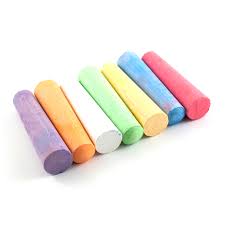chalk
英 [tʃɔːk]
美 [tʃɑːk]
- vt. 用粉笔写;用白垩粉擦;记录;规划
- n. 粉笔;白垩;用粉笔划的记号
- adj. 用粉笔写的
- vi. 变成白垩状
- n. (Chalk)人名;(英)乔克
使用频率:

记忆方法
将“chalk”与“talk”结合记忆,想象在黑板上用粉笔(chalk)讲话(talk),这样就可以通过视觉联想记住“chalk”的意思。
以上内容由AI生成, 仅供参考和借鉴
中文词源
chalk 白垩,粉笔
来自拉丁词calx, 石灰,石子,词源同calcite, calculate.
英语词源
- chalk
-
chalk: [OE] Latin calx meant broadly ‘lime, limestone’ (it probably came from Greek khálix ‘pebble’). This was borrowed in early times into the Germanic languages, and in most of them it retains this meaning (German kalk, for instance, means ‘limestone’). In English, however, it fairly soon came to be applied to a particular soft white form of limestone, namely chalk (the Old English word was cealc). The Latin word is also the source of English calculate, calcium, and causeway.
=> calcium, calculate, causeway - chalk (n.)
- Old English cealc "chalk, lime, plaster; pebble," a West Germanic borrowing from Latin calx (2) "limestone, lime (crushed limestone), small stone," from Greek khalix "small pebble," which many trace to a PIE root for "split, break up." In most Germanic languages still with the "limestone" sense, but in English transferred to the opaque, white, soft limestone found abundantly in the south of the island. Modern spelling is from early 14c. The Latin word for "chalk" was creta, which also is of unknown origin.
- chalk (v.)
- 1570s, "to mix with chalk;" 1590s as "to mark with chalk," from chalk (n.). Related: Chalked; chalking. Old English had cealcian "to whiten." Certain chalk marks on shipped objects meant "admitted" or "shipped free," hence some figurative senses. Chalk boards also were commonly used in keeping credit, score, etc., hence figurative use of chalk it up (1903).
权威例句
- 1. The two places, he insists, are as different as chalk and cheese.
- 他坚持说那两个地方有天壤之别。
- 2. With a stick of chalk he wrote her order on a blackboard.
- 他用一截粉笔将她的指示写在黑板上。
- 3. the chalk cliffs of southern England
- 英格兰南部的白垩质峭壁
- 4. I can't bear the sound of chalk scraping on a blackboard.
- 我受不了粉笔在黑板上摩擦时发出的刺耳声音.
- 5. He filched a piece of chalk from the teacher's desk.
- 他从老师的书桌上偷取一支粉笔.